There is no correct answer to this question. As long as you’ve given your baby the exclusive six months of breastfeeding or formula feeding before starting solids, you can decide when the timing is right. Frequently, mothers are required to go back to work or be away from their babies, and this requires weaning off breastfeeding.
How to Stop Milk Production If Not Breastfeeding
By: Dr. Maria Cerino - Updated May 14, 2024 - 13 Minute Read
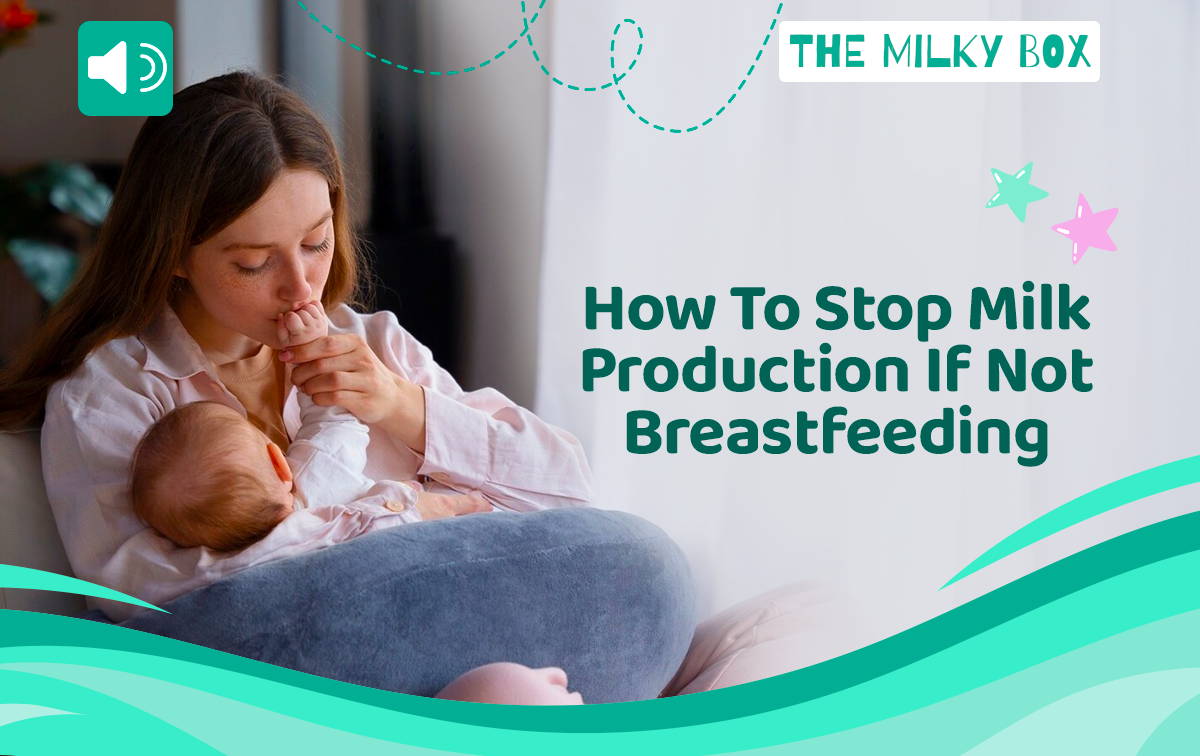
Producing nutritious milk is undoubtedly one of the most impressive and powerful abilities of a woman’s body. It is a huge part of motherhood, a way to strengthen bonds and find satisfaction in providing for your baby.
However, like all good things, it must come to an end. There is a platitude of reasons why this might need to happen, like some skin conditions, the need to be on certain medication, or simply, your baby’s focus has shifted to love for solids.
Whatever the reason, in today’s article, we will cover everything you need to know about stopping milk production.
Table of Contents:
1. Understanding Lactation and Milk Production
2. When and Why to Start Drying Up Breastmilk
3. The Timeline - How Long Before The Breast Milk Dries Up?
4. Methods to Stop Milk Production More Easily
5. Medications That Help Dry Up Breastmilk
6. Possible Side Effects of a Reduced Milk Supply
7. Coping Techniques for Post-Breastfeeding Depression
Understanding Lactation and Milk Production
After birth, the body's prolactin level rises steadily until it reaches a level that signals to the body that milk production is needed. Once lactation begins, the body relies on the baby's milk consumption and feeding frequency to adjust the milk production levels.
It works intuitively; that's the beauty of the human body. It adapts to the current demands and constantly changes as babies go through growth spurts, cluster feedings, and recover from colds.
When weaning your baby, it's best to do it slowly to allow their bodies to adjust. This means it's important to gradually reduce the milk they receive until they no longer need to nurse. While this process doesn't necessarily take long, giving yourself a few days to transition is essential if you need to stop temporarily.
When and Why to Start Drying Up Breastmilk
The reasons to start drying breast milk up will depend on the individual.
The most common reasons are:
● Medical reasons: This often involves the use of a medication that can be transmitted through breast milk to the baby, causing harm. Some other conditions also make breastfeeding painful or difficult.
● Personal preference: Some mothers struggle with milk production, sleep schedules, depression, or other conditions. This is perfectly normal; there is nothing to feel guilty about. Luckily, there are many excellent organic formulas to ensure their appropriate development.
● Work commitments: Most employers don’t offer enough support for mothers. With maternity leaves being short and spaces appropriate for pumping being rare at the workplace, a lot of moms face the need to stop their production early.
● Baby’s needs: Some babies are born with certain health conditions that make latching difficult; some require bottle-fed due to special nutritional requirements.
● It’s time: Breastfeeding can last up to 2 years for some moms. There is no right time to stop after the required six months of exclusive breastfeeding/formula feeding, but frequently, moms choose to stop breastfeeding to give space to other stages of life.
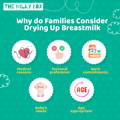
The Timeline - How Long Before The Breast Milk Dries Up?
There is no set timeline for breast milk to dry up. This varies from person to person, depending on their production, technique, and nutritional status. Usually, it is advised to wait for at least a week, but frequently it takes months. This is normal.
However, there is one red flag to keep an eye out for:
Suppose you notice your breast milk supply returning after it’s been dried up and there is no apparent reason. In that case, you might need to see your medical professional, as this is not normal, and some hormonal changes might happen in your body. They will determine what tests are needed and offer a plan of action focusing on the underlying condition causing this.
How to Safely Wean and Dry Up Breast Milk Supply
Multiple methods can help you wean off breastfeeding. Let’s start from the top: it’s a slow process. Don’t be discouraged if your supply seems to remain the same after a couple of days of trying.
The Basics
During the weaning process, it's essential to support your breasts only and adequately express the necessary amount of milk. Doing so will signal your body to slow down milk production. With that said, let's dive into the best tips for drying up breast milk without causing much discomfort.
Methods to Stop Milk Production More Easily
Weaning is unique and varies from one nursing mother to another. It is essential to remember that the weaning process can take time and patience, and it may require experimenting with different methods or a combination of techniques until you find what works best for you and your baby.
Decrease or Stop Feedings and Pumping
Gradually reducing feedings or pumping sessions after nursing or expressing milk can minimize discomfort. Avoid using pumping solely for comfort or any activities that stimulate the nipples, including sexual stimulation. However, occasional short periods of hand expression or pumping can ease pain without excessively increasing milk production if you’re dealing with engorgement.
Avoid Hot Showers
It is well known that hot showers can often trigger an ejection reflex, best known as a “let down.” Try not to let hot water hit your chest. Instead, face away from the shower and lower the temperature to avoid this. Some women swear by facing the shower with a towel over their chest when they need to, and it’s worth a shot.
If you’ve got a bath at home, that’s a great way to relax and soothe breast discomfort while weaning off.
Wear a Supportive Bra
A supportive bra is vital because it reduces the amount of pressure on the milk ducts as the weight is supported and evenly distributed. This is particularly important for ladies with bigger chests. It will also reduce the possibilities of engorgement, keeping things pleasant and painless.
However, binding is not recommended as it has been shown to cause mastitis, clogged ducts, and infections. The safer route is to find a bra that fits properly and has support but is not too tight or made with synthetic materials that can cause your skin to overheat.
Use Breast Pads
Breast pads are great for this transition period. They’re perfect for any unwanted leaking, as they’ll prevent you from staining your clothes and are easy to replace, keeping you dry and comfy all day.
Pay Attention to Your Diet
Some foods are naturally lactogenic; enhance milk production, and are a great option when you’re trying to get your production up.
However, if you’re trying to stop, we’d recommend taking a break from eating the following:
● Oats
● Brewers yeast
● Papaya
● Sesame seeds
● Fennel
● Beetroot
Medications That Help Dry Up Breastmilk
In some cases, milk production takes longer to stop. This is nothing to fear; it’s pretty common, but it may require some extra support. These need to be indicated by your healthcare provider after an evaluation, and they’re usually not the first line of treatment.
If you are nursing occasionally or storing breast milk for your baby, always check with your provider for the safety of any medication for your baby before you take it.
Birth Control Pill
The birth control pill is one of the most commonly used drugs to stop breastfeeding. The estrogen content in combination pills intervenes with the hormonal effects that support milk production. This requires a prescription, so check with your medical provider if you’re considering following this path.
Decongestants
Decongestants have also been used to stop lactation. Sudafed, as we commonly know it for being a cold medication, is great because it dries up secretions, helping us breathe better as runny noses are relieved. In the same fashion, it dries up secretions and slows prolactin secretion, decreasing milk supply.
Herbal Options
Herbs such as sage and peppermint have been used to stop milk production for centuries by many cultures. These can be consumed in teas and pills. Keep in mind that just like any drug, herbal remedies have their own safety risks and side effects, so it is essential to consult your doctor before starting one, particularly if your baby is still consuming your milk. That said, typically, high-quality herbs have a higher safety index profile than medications.
Medications No Longer Used
Many years ago, there used to be a shot given to mothers who needed to stop lactating. However, multiple side effects were found to be harmful after this exposition, so this practice has been discontinued.
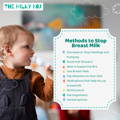
Possible Side Effects of a Reduced Milk Supply
When reducing your milk supply, you might experience some common side effects. These can range from engorgement to leakage to mastitis. You need to be ready to recognize them to effectively treat them.
1. Mastitis: Mastitis happens when the ducts have been full for a while. When the ducts transporting milk to your nipples get obstructed, it can form lumps in the breast, resulting in soreness, redness, and pain. Some home remedies can help, such as cabbage leaves, but unfortunately, mastitis requires a doctor’s help, as it can progress to a severe infection.
2. Engorgement: Breast engorgement happens when milk piles up in the ducts. It occurs when your body processes the change in feeding pattern. Pumping out all the milk from their breasts at once can be helpful to ease pressure and prevent excessive buildup. However, it's essential to consider that the more often you express milk, the more your body tends to produce. Balance is best in this case.
3. Milk Leakage: This is very common during the first few days. The body will try to express all the milk you produced at the rate you were before. Breast pads will become your best friends. Ideally, you need ones designed for weaning off, highly absorbent, and easy to change when you’re out and about to avoid damp skin for extended periods.
4. Post-Breastfeeding Depression: A lot of women struggle with the dynamic change once breastfeeding stops. It’s a very conflicting period, as losing that closeness can be difficult to process. Hormonally, the body changes, too: oxytocin and prolactin decrease as breastfeeding stops.
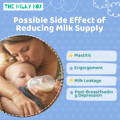
Coping Techniques for Post-Breastfeeding Depression
Worrisome symptoms of post-breastfeeding depression are mood swings, anxiety, and feelings of sadness or loss. Surrounding yourself with a robust support system is the key to overcoming these feelings. People who care for you, love you, and appreciate you will be your anchor during these dark times.
Being kind to yourself during this period and accepting change is a great way to deal with this loss. Let yourself feel these feelings, cry when you need it, journal about it, talk to your loved ones about it…not face it alone, and accept these moments as part of the process.
Self Care
Lastly, motherhood is exceptionally challenging, there is no denying it. Taking time to take care of yourself, such as taking baths, going on walks, and relaxing with your favorite show, will help you feel like yourself again. It’s here where you need support the most. People who can care for your little one for a few hours a week so you can enjoy healing time are required.
Experiencing these feelings is typical and expected; there is no shame in this process. You are never alone in it. If anything, it is a testament to your love for your baby, but it is essential to seek help when processing such a significant change.
When to Call Your Healthcare Provider About Drying up Breast Milk
There are some warning signs you need to keep in mind as you experience this transition:
● Running a fever
● Warmth or redness in the area
● Breast swelling
● General malaise
● Blocked duct that hasn’t opened in 12 hours
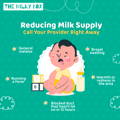
Feeding Your Toddler After Weaning
We know that families can worry about nutrition when weaning. Where do you begin?
Do you go straight to whole milk when introducing solid foods? What about food gaps?
How will you make sure that your child is meeting all the requirements needed for healthy growth and development?
European Toddler Formula
Toddler Formula is usually recommended for children transitioning from breast or infant formula to a balanced whole-food diet. It provides additional nutrients and vitamins for the child's growth and development during this critical stage.
Moreover, some toddlers may have unique dietary requirements or health concerns, which could make toddler formulas a more suitable option than regular cow's milk.
In such cases, it's crucial to consult with your medical provider. This step ensures that you're well-informed and can make the best decision for your child's specific needs and circumstances.
European Toddler Formula resources to get you started:
★ Toddler Formula: The Ultimate Guide
★ When Do Babies Stop Drinking Formula?
★ How to Help a Baby or Toddler with Gas

In Conclusion...
Breastfeeding is a beautiful stage in life, and while its benefits are excellent, it is a process that requires some time to let go of. Physically and emotionally, it carries a heavy load for most mothers, who need to receive all the support available to deal with this change.
Time will become your friend when it comes to weaning off. There is no secret to stopping milk production as much as there are many helpful tips, such as slowing down the number of daily feedings and avoiding triggers such as touch, pressure, and heat on your breasts.
As always, when in doubt, consult a medical professional to make informed decisions that can benefit you and your baby, and don’t forget to check out other informational articles on our blog at The Milky Box.
Frequently Asked Questions
At what stage should I stop breastfeeding?
Can I use formula while weaning off breastfeeding?
Yes. This is a great idea, particularly when taking medications to help your process. It’s just a matter of choosing the right formula for their age and nutritional needs and transitioning them into it.
Will pumping stimulate milk production?
Yes. Unfortunately, if you pump regularly instead of breastfeeding, your brain is still getting the signal that milk production is needed. Pumping should be slowly stopped in frequency, as well, to stop your milk production completely.
Can I stop breastfeeding cold turkey?
This is not recommended, as it can be traumatic for both the baby and the mother. An abrupt stop like that can cause fear and anxiousness in babies, plus an abrupt accumulation of milk will most likely result in mastitis, engorgement, and pain for the mother.
Disclaimer:
Please be aware that this information is based on general trends in babies, and it is not medical advice. Your doctor should be your first source of information and advice when considering any changes to your child’s formula and when choosing your child’s formula. Always consult your pediatrician before making any decisions about your child’s diet or if you notice any changes in your child.
Breastfeeding is the best nutrition for your baby because breast milk provides your child with all the essential nutrients they need for growth and development. Please consult your pediatrician if your child requires supplemental feeding.

Dr. Maria Cerino is a medical doctor and a researcher from Mexico, her works being published in prestigious journals like the American Journal of Human Biology among others. As a medical writer, Dr. Cerino focuses on infant nutrition and healthy neurological development in infants and children. In her free time, she enjoys going on walks, watching indie films, and cooking at home.
Read Next:
Reviewed by Dr. Eric Wood, ND, MA

Dr. Wood is a licensed naturopathic doctor, with a doctorate degree from the Canadian College of Naturopathic Medicine in Toronto, Canada. He received his post-graduation certification in Mind Body Medicine at Harvard University.
With 15 years of experience, Dr. Wood is an Associate Professor of Holistic Nutrition at the American College of Health Sciences in Portland, Oregon. Dr. Wood is an educator, clinician, author, media figure, consultant, and owns his own holistic (naturopathic) medical practice in Ft. Lauderdale, Florida. Dr. Wood is currently researching and drafting books on cancer and pediatrics.
Outside of the medical profession, Dr. Wood loves singing with the Miami Lyric Opera and is an avid musician in South Florida. He also loves spending time with his wife and kids.

